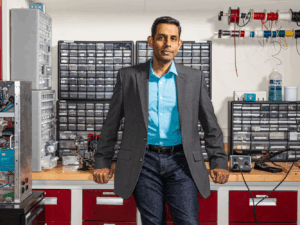When Dr. Stefano Dalla Gasperina, a postdoctoral researcher, joined the ReNeu Robotics Lab at The University of Texas at Austin, he became part of a team that had spent years advancing robotic systems to support stroke rehabilitation under the leadership of Professor Ashish Deshpande—giving new life to the team’s participation in the NSF National I-Corps™ program with the MAESTRO hand exoskeleton.

Professor Ashish Deshpande – Intellectual Property owner
Representing the MAESTRO team, Dr. Dalla Gasperina, PhD candidate Haiyun Zhang, and their industry mentor, Rohit John Varghese, joined I-Corps with the intent to explore commercialization options for their innovation, a wearable cable-driven exoskeleton originally designed to help post-stroke patients.
“Throughout the years, the team has made steady progress on our mission to improve the lives of those recovering from stroke,” said Professor Deshpande. “But with the recent momentum in embodied AI, we had a strong hunch that the core technology could have broader applicability. What we didn’t expect was how clearly I-Corps would help us see that, especially as a solution for collecting rich motion and force data, the kind that’s urgently needed to teach intelligent robots dexterous manipulation.”

Dr. Stefano Dalla Gasperina – Postdoctoral researcher at the University of Texas at Austin
But after conducting over 120 interviews across robotics, AI, rehabilitation, and virtual reality sectors during their time at I-Corps, the team reached a clear conclusion: the clinical world wasn’t the right market. At least for now.
“Through our I-Corps interviews and engaging with the program, we discovered a far more urgent and widespread pain point—one that cut across AI labs, robotics startups, and embodied intelligence teams—a shortage of high-quality, real-world data to train dexterous robotic systems. That’s where our technology made more sense to the market. It could help address a core challenge shared by both academia and industry: enabling robots to learn complex manipulation skills through high-fidelity human demonstrations,” said Dalla Gasperina.
Worn by a human operator, MAESTRO enables real-time teleoperation of a robotic hand while simultaneously collecting detailed data on hand position and interaction forces. What sets it apart is its bilateral control framework—the system not only sends commands from the human to the robot but also renders force feedback from the robot back to the operator, allowing them to feel how the robot interacts with its environment. This closed-loop, human-in-the-loop approach doesn’t just guide robot behavior; it captures richer, more realistic demonstrations of embodied AI teams training robots to perform complex, coordinated tasks like grasping, manipulation, or tool use.
The I-Corps experience helped the team reframe how their technology could create value in the market. What began as a hardware-first rehabilitation tool for patients evolved—through customer discovery—into a potential data collection platform positioned further up the supply chain. Rather than focusing solely on building a device, the team began envisioning a solution that could provide the high-quality demonstrations AI models need to learn human-level dexterity. “We realized we might not be developing just a product, but a tool to help robots learn from humans—the way humans learn from each other,” said Dalla Gasperina. “The I-Corps program is often alluded to as a crash-course MBA for scientists.” said Varghese “As industry mentors, we see incredibly talented, PhD.-holding scientists thrown straight into the deep end of battle testing commercial hypotheses and product-market fit. It’s a completely new skillset to learn, and one that is of extreme value to turn the best of American research into commercial successes!”
While many companies focus narrowly on building robotic systems, few are addressing the deeper challenge: how to bridge the gap between today’s anthropomorphic robots and the fluid, coordinated precision of human movement. That’s where MAESTRO positions itself—not just as a device, but as a teaching tool that enables robots to learn from humans with human-like motion. By enabling bidirectional interaction, MAESTRO captures both the input signals from a human operator’s fingers (how we move) and the force feedback from the robot’s sensors as it interacts with objects (what we feel). This integrated, human-in-the-loop framework allows for richer, more realistic data collection that better mirrors true human dexterity—something most vision- or motion-based systems alone cannot yet provide.

Haiyun Zhang – Doctoral student at the University of Texas at Austin
What also makes this team uniquely qualified is their expertise in human-centric mechatronic system design, which could massively accelerate the real-world data collection efficiency.
“Real-world data shortage is a common issue raised by many robotics AI companies,” Zhang added. “Since their expertise lies in developing AI algorithms, they often rely on off-the-shelf solutions for data collection. However, most of these products aren’t carefully designed for physical interaction—things like force sensing, haptic feedback, and hardware integration. That’s where we come in.”
Looking ahead, the team is actively seeking pilot opportunities to validate and refine their integrated system. A partnership with companies developing advanced humanoid robots would be an ideal fit—offering the chance to integrate MAESTRO’s human-in-the-loop data collection with next-generation robotic systems. The team envisions these collaborations as a way to bridge the gap between hardware and intelligent behavior, supplying the real-world demonstrations needed to train more capable, dexterous machines.

Rohit John Varghese – Director of Systems Engineering and Products at Contoro Robotics
In addition, the team welcomes collaboration with robotics startups, AI labs, and companies working on dexterous manipulation who may benefit from high-quality demonstration data or force-feedback control systems. Whether through pilot testing, co-development, or research partnerships, the MAESTRO team is keen to work with innovators across the embodied AI and intelligent robotics ecosystem.
For now, the team remains focused on research, refinement, and discovery. They credit I-Corps with helping them make the leap from lab curiosity to commercial clarity.
“It taught us to look beyond what we had built,” Dalla Gasperina reflected. “And ask what the world actually needs.”








